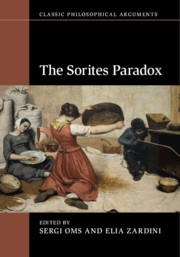Book contents
- Frontmatter
- Contents
- List of Contributors
- Acknowledgements
- Prelude
- Part I Solutions to the Sorites Paradox
- 1 Epistemicism and the Sorites Paradox
- 2 Supervaluationism, Subvaluationism and the Sorites Paradox
- 3 Contextualism and the Sorites Paradox
- 4 Incoherentism and the Sorites Paradox
- 5 Intuitionism and the Sorites Paradox
- 6 Rejection of Excluded Middle and the Sorites Paradox
- 7 Dialetheism and the Sorites Paradox
- 8 Degree Theory and the Sorites Paradox
- 9 Non-Transitivism and the Sorites Paradox
- Part II The Influence of the Sorites Paradox
- Coda
- References
- Index
2 - Supervaluationism, Subvaluationism and the Sorites Paradox
from Part I - Solutions to the Sorites Paradox
Published online by Cambridge University Press: 20 September 2019
- Frontmatter
- Contents
- List of Contributors
- Acknowledgements
- Prelude
- Part I Solutions to the Sorites Paradox
- 1 Epistemicism and the Sorites Paradox
- 2 Supervaluationism, Subvaluationism and the Sorites Paradox
- 3 Contextualism and the Sorites Paradox
- 4 Incoherentism and the Sorites Paradox
- 5 Intuitionism and the Sorites Paradox
- 6 Rejection of Excluded Middle and the Sorites Paradox
- 7 Dialetheism and the Sorites Paradox
- 8 Degree Theory and the Sorites Paradox
- 9 Non-Transitivism and the Sorites Paradox
- Part II The Influence of the Sorites Paradox
- Coda
- References
- Index
Summary
One way in which we might approach the challenge posed by the Sorites Paradox is considering that Sorites-susceptible predicates have several candidate extensions, or several ways in which these expressions can be made precise. For example, a candidate extension for the predicate ‘is a baby’ is the set of humans of less than two years, but also the set of those less than two years and one second, and of those less than two years and two seconds. In this chapter we present and discuss two theories for vague predicates based on this idea: super-valuationism and subvaluationism. The chapter is structured in three parts. The first presents the super- and subvaluationist theories: their similarities and differences in the semantics, the resulting logics with their most characteristic features. The second reviews the super- and subvaluationist solutions to the Sorites Paradox and provides discussion on several controversies surrounding these theories. The third part introduces proof procedures for s’valuationist logics.
- Type
- Chapter
- Information
- The Sorites Paradox , pp. 38 - 62Publisher: Cambridge University PressPrint publication year: 2019
- 1
- Cited by



